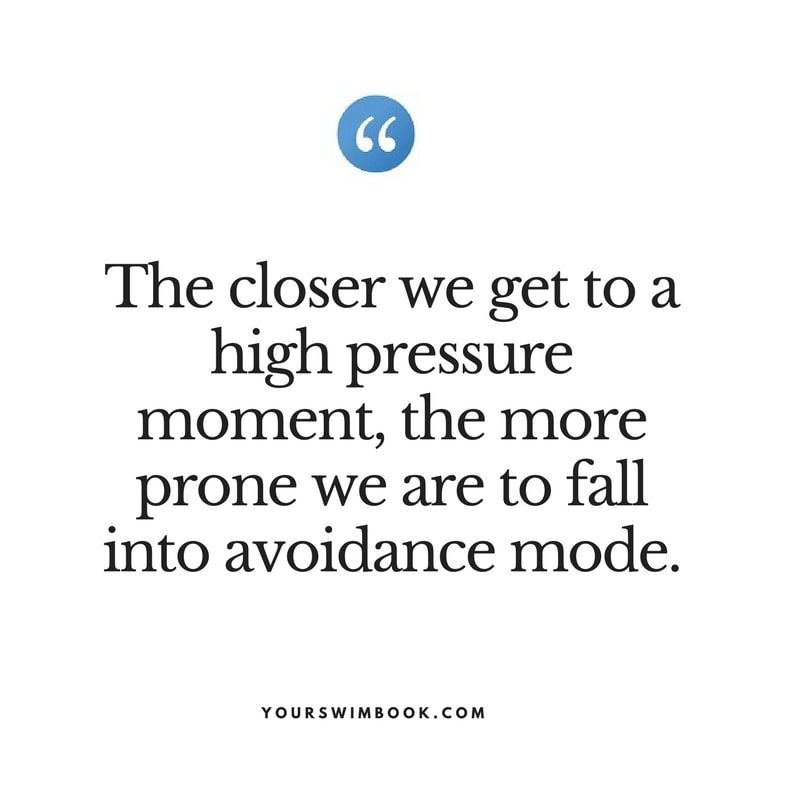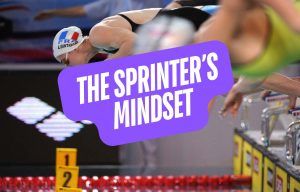From the beginning of the season until that last big race of the year you will experience two different types of motivation when it comes to your goals. Here’s how to make the good one stick so that you can crush it in championship season.
Confession time:
As an age group swimmer I didn’t always enjoy tapering.
Sure, I appreciated the extra energy from the decreased volume. And the sleep-ins. And generally, feeling better in the water.
But there was something mentally that was happening that I couldn’t quite my finger on…
Gone was the confidence and hunger, the willingness to go to the pool and punch practice in the face.
Now I was over-thinking everything and anything. How I felt in the water. That little ache in my shoulder. The race pace work at yesterday’s swim practice.
And on and on.
The closer I got to the big meet the more neurotic I got…
- What if I just go to the pool and bang out a really hard work workout to give myself a last-second edge….
- Am I getting out of shape?
- What if I simply suck at swimming?
Often, I simply wanted to get the meet over with so I could stop doubting myself and go back to training hard.
As it turns out, this mental yo-yo isn’t just limited to tapering.
The closer we get to achieving something the deeper the doubt.
The Two Phases of Motivation We Experience
From the start of a big, greasy goal to its completion we experience two different kinds of motivation.
The first is thought of as “promotion motivation.”
Or, as I like to think of it, building motivation.
The way we feel during this phase is recognizable, because it’s a lot of fun and we tend to enjoy it. We are focused on our goals, what it’s going to take to achieve it, and we pursue aggressive, optimistic plans in order to make it happen.
We are in the business of building ourselves up into becoming the swimmer we’ve always dreamed of being and business is booming.
But, as our plans start to pan out, and we get closer to achieving our goals (cough-the big meet-cough), we begin to pump the brakes on our aggressiveness.
We get more defensive. We begin to adopt avoidance-oriented tactics. We start acting from a position of not wanting to lose versus wanting to win.
In other words, we slip into the prevention motivation phase.
This phase, is different in the sense that now we are more worried about losing than we are about gaining. We go into loss-prevention mode.
And when it comes to goal setting and motivation, avoidance has been shown to be far less effective when it comes to performance.
How to Stay Aggressive Longer
When you start focusing on the things that are going to go wrong, and get dialed in on not screwing up, your actions eventually follow.
(What you think is what you do. Your actions follow your thoughts.)
The big thing you can do to stay aggressive is to focus on the process and relax.
1. Stay focused on the process.
The closer we get to our goals the more we start to stress about the results.
This stress comes from a deep uncertainty of what will happen, and this stress can completely crater your performance in the pool.
How do we avoid the unnecessary worry and performance-sapping stress? Start by staying within your own performance and not worrying about what others are doing.
This means spending your thoughts and energy on the things you can control. Like your pre-workout routine, your technique, your streamline, crushing every one of your breakouts like they owe you lunch, your nutrition and hydration, your sleep habits, and so on.
2. Do what you need to do to stay relaxed.
When you watch the top swimmers in the world walk behind the blocks the thing that is most striking is how relaxed they appear.
Sure, the butterflies are probably flying at hurricane speed in their belly, but outwardly their body language exemplifies a loose, relaxed state.
And this kind of looseness is critical for high performance.
Do what you need to do at practice, and then turn off your swimmer brain between practices.
Many a swimmer has driven themselves crazy obsessing over the big race or big meet, exhausting themselves with stress long before ever stepping up on the blocks.
Practicing gratitude can help.
Strategic journaling can help throw some cold water on your anxiety.
(While we are at it, here are three more killer ways to stay calm and focused behind the blocks.)
Do what you need to do to unplug and avoid the over-thinking that crushes your confidence in the weeks and days leading up to the big meet.
More Stuff Like This:
The Science Behind Setting Better Goals in the Pool. What do the people in the white lab coats have to say about effective goal setting? We break it down so that you can apply it to your goals in the water.
How Katie Ledecky Took Her Training to the Next Level. One of the most aggressive and fearless swimmers in the world today used this old-school training tool to help power her to her first Olympics. (Spoiler alert: It’s a log book!)













